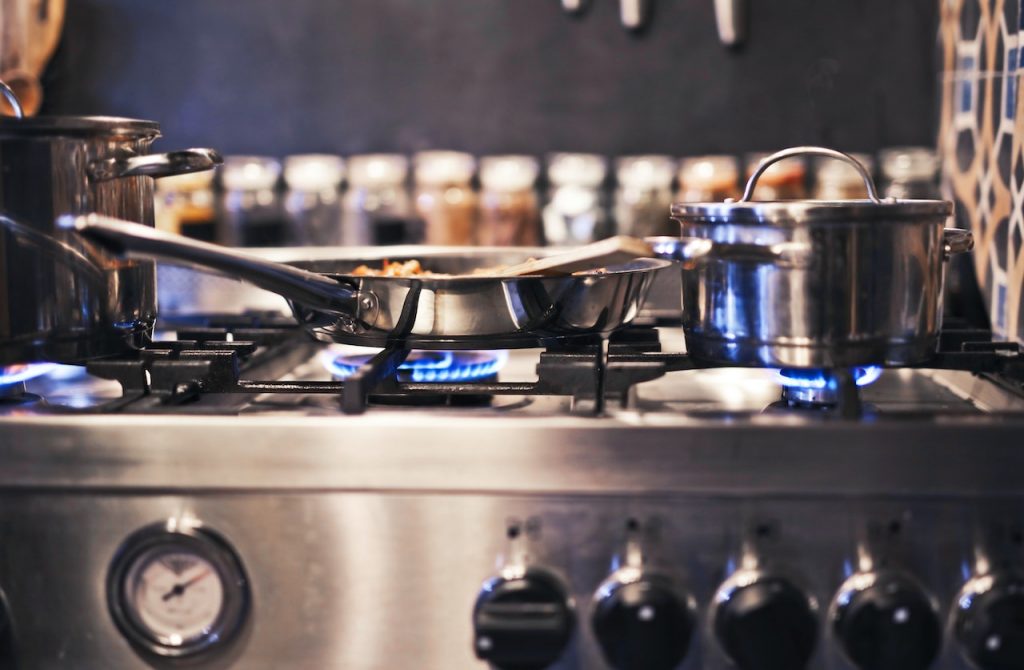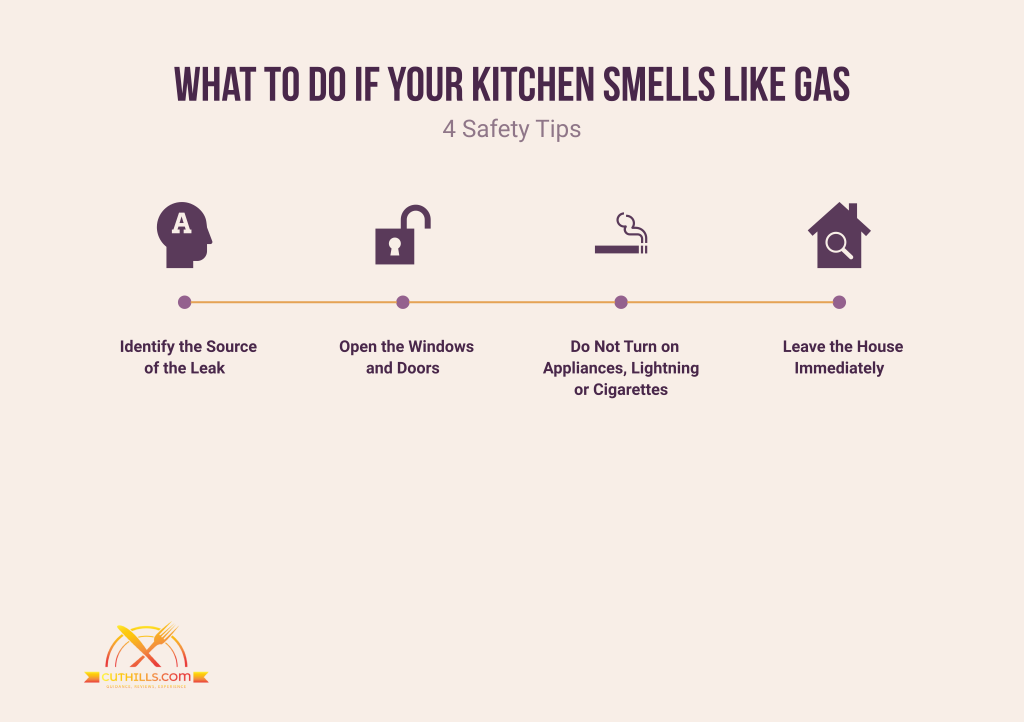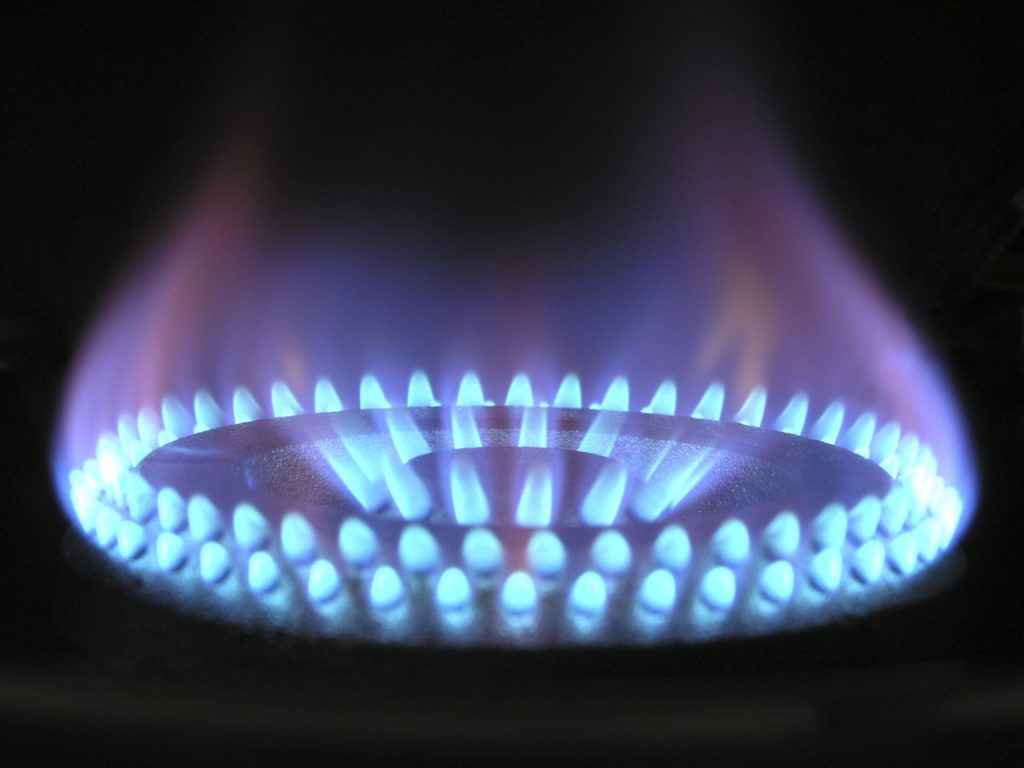Does your kitchen smells like gas? If so, you may have a gas leak. Kitchens are among the most common areas for gas leaks because of all the natural gas appliances. If you determine any gas leak, take action immediately. This blog post will go over what you must do if you think there are gas leaks in your kitchen. We will also provide some information on preventing gas leaks in the future.
How to Determine a Gas Leak?

Among the most dangerous household hazards is a gas leak. Gas can be highly flammable and can explode if it builds up in a confined space. There are ways to know if a gas leak is present.
❗The Smell of Gas
It is among the most obvious sign, and If you notice a faint odor of rotten eggs or sulfur, it could be an indication that there are gas leaks. Hissing or Whistling Noise
Another telltale sign is a hissing or whistling noise from your stove, furnace, or water heater. If you see any gas leak signs, it’s important to act quickly.
❗Discolored Flames
If you have a gas stove, look closely at the flames. Gas flames should be blue. If they are yellow or red, it could indicate a gas leak.
❗Soot or Stains Around Appliances
It is also essential to inspect your appliances for any soot or stains. These could be gas leaks.
What to Do if Your Kitchen Smells Like Gas

If your kitchen smells like gas, it’s essential to take action right away. Gas leaks can be dangerous, so addressing the problem as quickly is a must. Here are a few steps to take if you think there are gas leaks in your kitchen:
✅Identify the Source of the Leak
If you think you have a gas leak in your kitchen, the first thing you must do is identify the source of the leak. There are three main places where gas leaks can occur: at the stove, at the oven or the refrigerator. In order to check for a leak at the stove, simply turn off all the burners and see if the smell goes away. If it does, the leak is coming from one of the burners.
In order to check for a leak in the oven, turn off the oven and see if the smell goes away. If it does, you know the leak comes from the oven.
Finally, to check for a leak in the refrigerator, turn off the fridge and see if the smell goes away. If it does, the leak comes from the fridge. Once you’ve determined the gas leak sources, take steps to solve them. In most cases, simply replacing a faulty gasket or burner will do the trick. However, if you’re not confident to fix the problem, ask for assistance from a professional.
✅Open the Windows and Doors
Whenever you ever perceive any gas leak, it is important to take quick and decisive action. You must open the windows and doors in your kitchen. It will help to ventilate the area and disperse any gas that may have accumulated. If your kitchen has an exhaust fan, then you can turn the exhaust fan. The fan will help to remove any gas that may be present in the air.
✅Do Not Turn on Appliances, Lightning, or Cigarettes
Do not turn on any appliances, lights, or cigarettes. These can create sparks that could set up a fire. If you must use the phone, use a cell phone or another phone away from the house.
✅Leave the House Immediately
When the kitchen smells like gas, it is important to leave the house immediately. Gas leaks are dangerous, and a small spark could cause explosions. Once outside, you can call the gas company or the authorities to report the leak. Never re-enter premises that have been evacuated due to gas leaks until it is all cleared.
The Risk of Gas Leaks
Natural gases are essential to our lives, providing power and heat across the country. However, natural gas can also be highly flammable, and leaks can seriously threaten public safety. Here are the dangers of gas leaks:
🔴Asphyxiation or Dizziness
Among the common dangers of gas leaks is asphyxiation. Gas can be heavier than air and can accumulate quickly within confined areas. The gas can quickly fill up the space, causing dizziness or lightheadedness, or worst, passing out.
🔴Explosions
Another danger of gas leaks is the risk of explosion. The gas can eventually explode once accumulated. Gas explosions are extremely dangerous and can cause large-scale damage to any property.
🔴Fire
Gas leaks can also cause fires. If a gas leak is in your home, the gas can eventually catch fire. Gas fires are hazardous and can quickly spread throughout your home or business.
🔴Higher Bills
If you have gas leaks, you may notice higher bills. This is because the gas company will charge you for the gas that is being leaked and it can be costly to repair.
Preventing Gas Leaks in the Kitchen

As with any accident, preventing the problem from happening is the key. Here are tips for preventing kitchen smells like gas or gas leaks in the kitchen:
❕Check Your Stove Regularly
A gas stove is a convenient and efficient way to cook, but it also comes with some risks. Among the serious dangers is a gas leak. A gas leak can occur if a stove is installed inadequately. It can also happen if the stove is damaged in some way.
Even a small leak can be dangerous because gas can be highly flammable and can quickly be explosive levels when it builds up. So it’s crucial to check your stove regularly for signs of a leak. If you smell gas, see a flame, or hear a hissing sound, turn off the stove immediately and call a professional to have it checked out.
❕Don’t Use Appliances in Confined Spaces
Gas appliances, such as stoves and ovens, produce carbon monoxide. It’s an odorless gas that is hazardous once it accumulates. So it’s essential to use gas appliances in well-ventilated areas. Don’t use them in confined areas, such as closets or cabinets.
❕Install Detectors
Gas detectors are alarms that detect natural gas’ presence. It can help prevent a gas leak from going undetected, giving you time to open windows and evacuate the premises. Detectors should be installed in the kitchen, and they should be checked regularly to make sure that they are working properly. Here are some gases that a gas detector can detect:
◼️Radon
It is natural gas in every home. While it is not hazardous in minimal amounts, prolonged vulnerability to high radon levels can be dangerous. Radon gas detector kits are available online and in most hardware stores. These kits typically come with a test tube and instructions on how to place the tube in your home.
Once the tube has been placed, it will be required for analysis in the lab. The test results will indicate the radon level present in the kitchen or home. If the level is high, you must take measures to mitigate the problem. A qualified contractor can place mitigation systems for radon. These systems work by venting radon gas from your home and releasing it into the atmosphere, where it dissipates harmlessly.
◼️Toxic Gases
There are a variety of gases that can be classified as toxic, depending on their chemical composition and concentration. Some common examples include carbon monoxide, sulfur dioxide, and ammonia. These gases can cause a variety of health problems, ranging from respiratory irritation to neurological damage.
Gas detectors are devices that can measure the concentration of these air gases. Regularly checking the readings on a gas detector can help ensure that your workplace or home is safe from these potentially harmful substances.
◼️Combustible Gases
Although we cannot see or smell it, gas can be all around us. In fact, most of the air we breathe is made up of gas. However, some gases can be dangerous, especially if they spread in enclosed areas. That’s why having a gas detector in your home is important. Gas detectors can sense the presence of combustible gases, such as methane and carbon monoxide, and warn you when levels are high. It gives you time to ventilate the area or evacuate the premises.
Detectors are a crucial part of keeping your family safe from harm. When choosing a gas detector, choose one approved by a reputable safety agency, such as Underwriters Laboratories. You must determine the sensor type used, as well as the size and placement of the unit.
Frequently Asked Questions
Can a gas stove leak gas?
Yes, gas stoves can leak gas. While gas stoves are very convenient, they can be dangerous if not efficiently maintained. Among the common problems with gas stoves are leaking. If there is a leak, it can cause an explosion or fire. A faulty valve or connection usually causes gas leaks. If you notice that the stove is leaking, it is important to have it checked by a professional as soon as possible.
What produces a kitchen smells like gas?
A few different things can produce a smell like natural gas in your kitchen and there could be an actual gas leak. It might also be causing a partial blockage in your kitchen sink drain. It can happen if grease or food builds up on the drainpipe and cause a partial blockage. When water drains through the partial blockage, it can smell like natural gas.
You can try to clear the drainpipe yourself or call a professional. Also, if you have a garbage disposal, it could be that the blades are dull or something is caught in the disposal. Either way, cleaning or replacing your garbage disposal should solve the problem.
How to determine if the stove is leaking gas?
The natural gas smell is the most obvious sign that your stove is leaking. Natural gas can be odorless, but some gas companies would add a foul-smelling chemical to it so that leaks can be easily detected. If you notice this distinct scent, open the windows and doors to ventilate the area, turn off the gas supply to your stove and call a qualified technician to repair the leak.
Other signs that your stove may leak gas include hissing or whistling sounds near the stove, unusually low or high flames, and soot or yellowish-brown stains on or around the appliance. Taking action is important to avoid a potentially dangerous situation whenever there are gas leaks.
Will gas leaks set fire alarms off?
Most home fire alarms are designed to detect smoke, not gas. However, a significant gas leak can cause enough accumulation of heat and sparks to set off the alarm. In addition, some newer fire alarms are equipped with sensors that can detect smoke and carbon monoxide, another by-product of combustion. So, evacuate the premises immediately, and once you are out safely, you can call for help. Do not re-enter the building until you have been given the all-clear by a professional.
How common are gas explosions in homes?
Gas explosions are rare, but they can be damaging. A leak in the gas line causes gas explosions. This can happen if the gas line is damaged or a loose connection. If the gas leak is small, it may not be enough to cause an explosion. However, an explosion can occur if the gas leak is large or if there is an accumulation of gas in the area.
Gas explosions can also be caused by damage or broken appliances, such as a stove or furnace. In these cases, the appliance can create a spark that ignites the gas and leads to an explosion. While gas explosions are not common, they can be extremely dangerous. If you smell gas in your home, it is essential to evacuate the area immediately and call the Gas Company.
Final Words
Safety is always the number one priority when it comes to natural gas. If your kitchen smells like gas, it is essential to take action immediately to avoid a potentially dangerous situation. The information in this article will help you to determine the cause of the smell and what you can do to resolve the issue. I hope this article was helpful.
